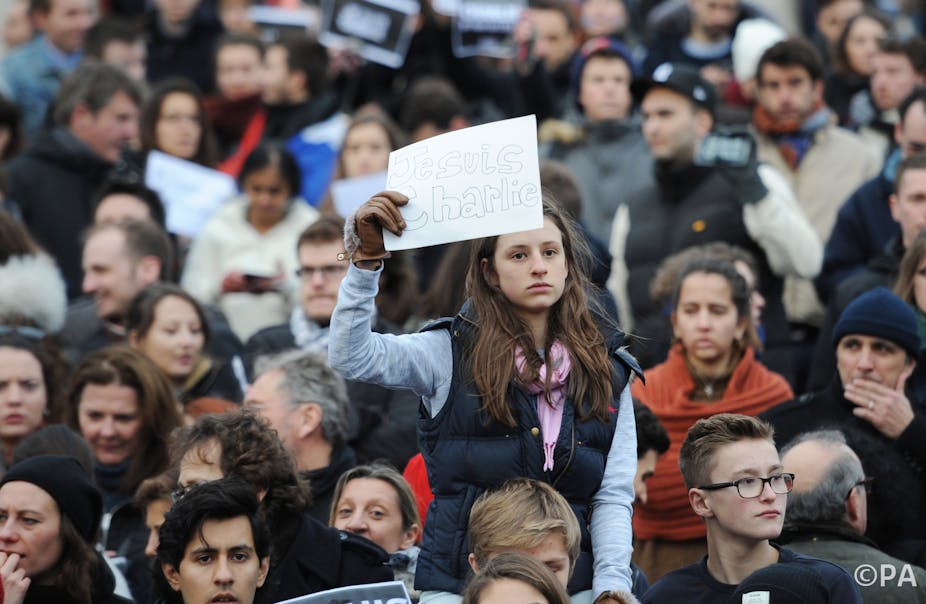One of the many debates generated by the recent terrorist attacks in Paris has been centred on the different ways that older and younger generations understand and support the concept of free speech.
In a recent article headlined: “We may be Charlie but our children are not”, Times journalist Alice Thomson observed that the young generation are: “far more racially and culturally sensitive than mine ever was” and while they may “wear the T-shirt in solidarity with the victims”, they recoil from imagery that they instinctively perceive as offensive.
This is particularly the case at universities, where all manner of speech and imagery finds itself banned – sometimes amid a huff of offended protest. This has become more routine now, because causing offence is deemed to be “unsafe”.
Touchy subject
Thomson pointed out that today’s pupils are very different from the radicals of the 1960s who ran Charlie Hebdo. While “the older generation came of age in the Cold War and wanted to reassert the rights of the individual in a world divided between capitalism and communism”, she argued, the kids of today have spent their formative years schooled in hyper-sensitivity to the problem of causing offence.
In this context, “free speech” seems to take on a different meaning. Young people today often feel that you can have the freedom to hold your own views and beliefs, but that it is very bad for people to try to impose their beliefs upon you. You should be very wary of expressing your views and beliefs, in case these are perceived as an attack by people who think differently. And you should feel mortally wounded if anyone criticises what you say about yourself.
This is a paradoxical freedom of speech: a value that is sincerely held, but only so long as nobody says anything critical or controversial.
How have we got here?
Thomson is right to point to the 1960s as a time where freedom of expression was held in particular regard by a section of young people – often known, in shorthand, as “radical youth”. These young people were frustrated both by the stultifying social conventions of their own post-war societies and the outright repression manifested by the Communist alternative in Eastern Europe. At home, publications such as Lady Chatterley’s Lover and Oz magazine were put on trial for obscenity and became national causes célèbre. In the Soviet Union, dissident writers were sent to gulags.

Radical youth rallied around freedom of speech as part of an idealistic commitment to a more modern, tolerant world. The enemy lay within old-fashioned sexual, racial, and social conventions; offending against those conventions was not only the way to make a point about freedom, but the point itself. The dream was a society in which people could express their own beliefs and, more generally, “be themselves”.
Generation X
By the 1990s, when I was an undergraduate, we were pretty much living that dream. Racial diversity was embraced, openness about sex and sexuality was practically mandatory, and we tolerated other faiths as easily as we tolerated other hairstyles. But this was Generation X, forged not in an idealistic commitment to the future, but in a culture of defeat. The only thing students could agree on was that any threat to the “non-judgmentalism” that characterised debate at the time had to be banned, no-platformed and chased off campus.
Fascists, extremist Islamist groups, the Sun newspaper, “homophobic” Christian groups, logos for coffee shops and even “free speech” societies found themselves banned during the 1990s. Those of us who stuck up for freedom of speech ended up pitted against an implacable logic that was, to our generation of students, common sense. If you want a tolerant society, went the argument, you have to suppress intolerant ideas. In this perspective, freedom of speech was only possible if dangerous ideas were prevented from taking hold. And since nobody else had very much to say, the radical censors normally had their way.
Criticism avoided
Young people now, on campuses and elsewhere, seem more open-minded than Generation X. They certainly have more to say for themselves – and to more people. The ubiquity of social media means that the ability to use words and images in a public forum is sincerely cherished. From toddlerhood, young people have been encouraged to express themselves, develop their identity, and take part in discussions about the world in which they live. But the self-expression that is encouraged is a rather fragile one, which only works so long as nobody criticises it.
It’s not that the Baby Boomers are better. The notion that tolerance means refusal to judge people for their differences goes back to the 1960s, after all. And this has been an important component in today’s uneasy sense that a tolerant society should be one in which offence is simply avoided. Somewhere along the line, the other side to the case for freedom of expression got lost.
Where self-expression is prized, the right of others to express themselves in ways that seem threatening or offensive has to be valued too. So does the right of people to criticise, satirise, or ridicule their own self-expression, something that really is anathema to generations for whom bad ideas are dangerous and self-esteem is all-important.
So we need to upset people and argue things out. Otherwise we’re not really talking about self-expression, or freedom of speech, at all. We’re playing within a set of social conventions that are every bit as backward and stultifying as those that would have banned a novel in case it fell into the hands of your “wife or servant”.

